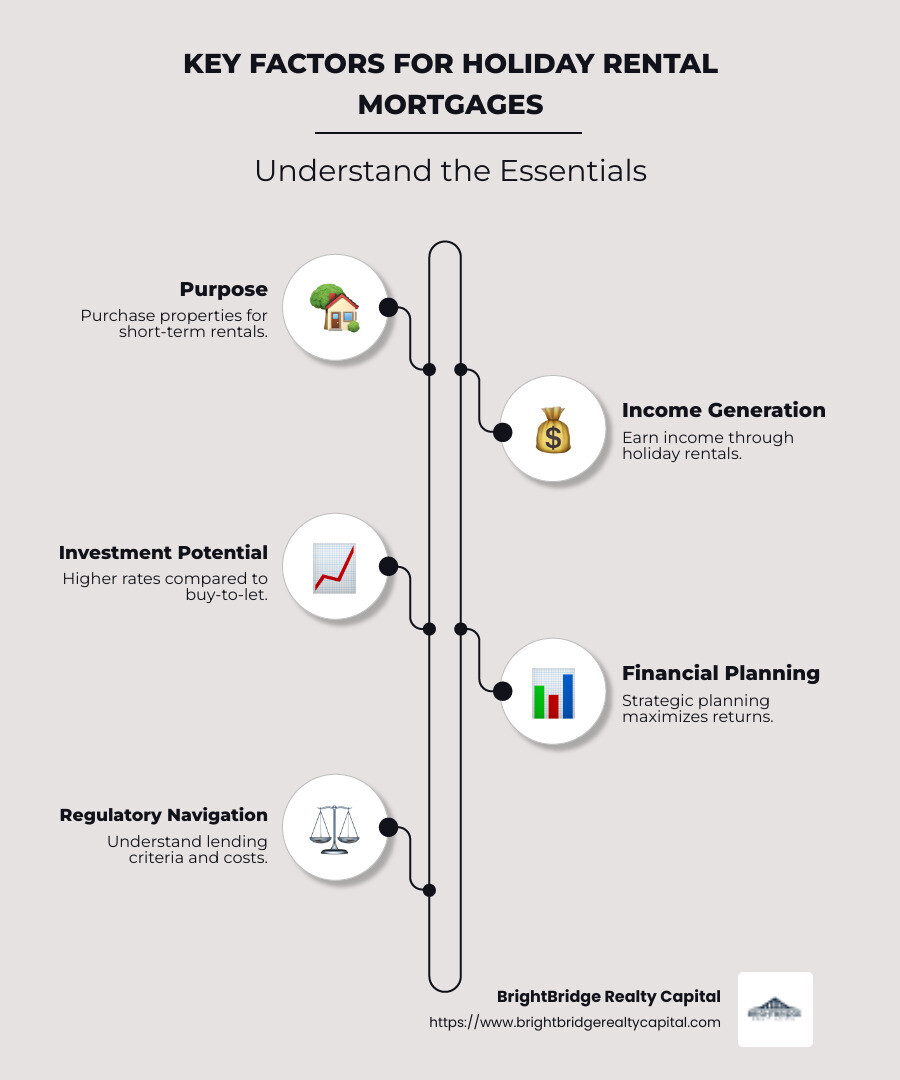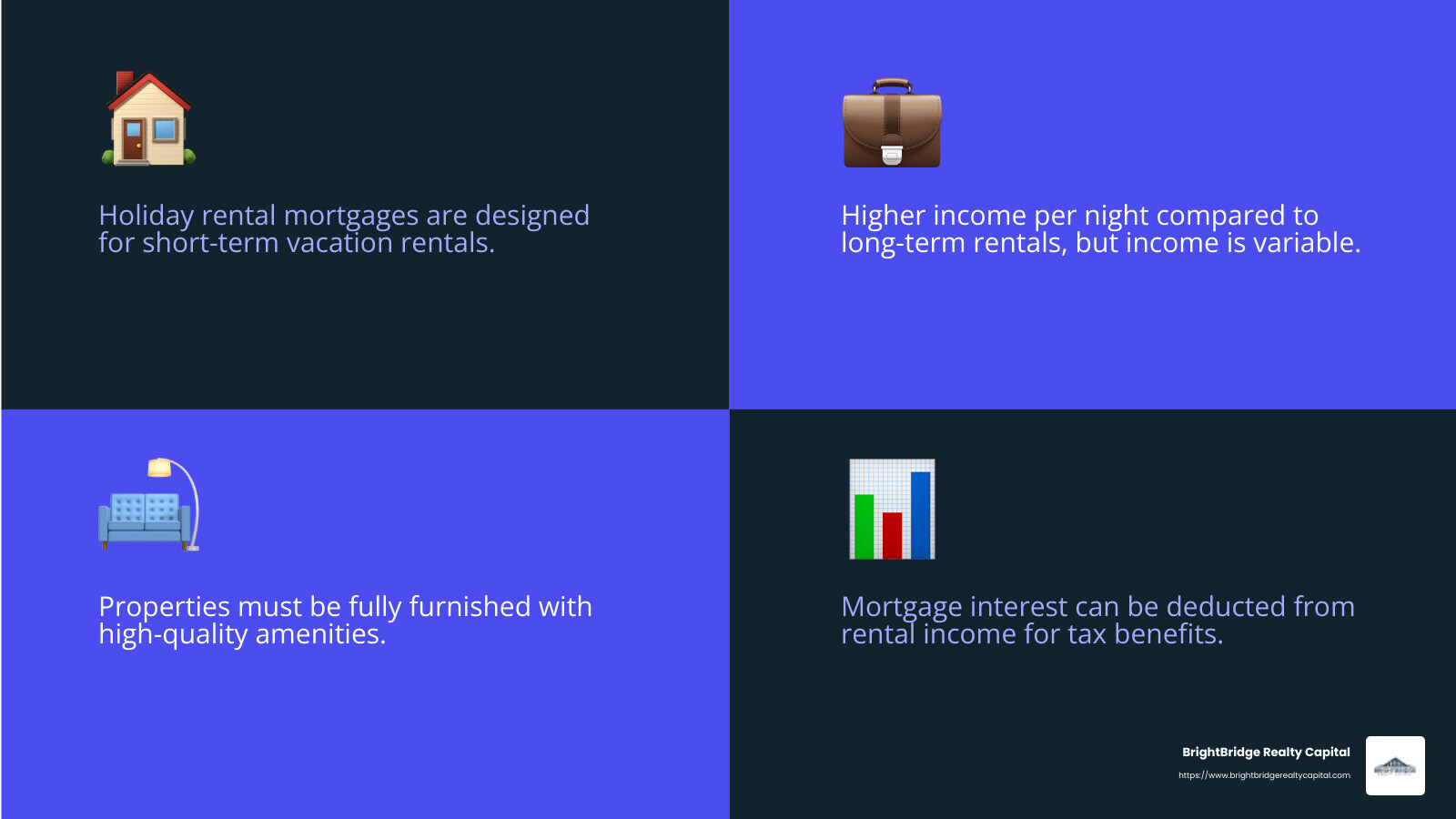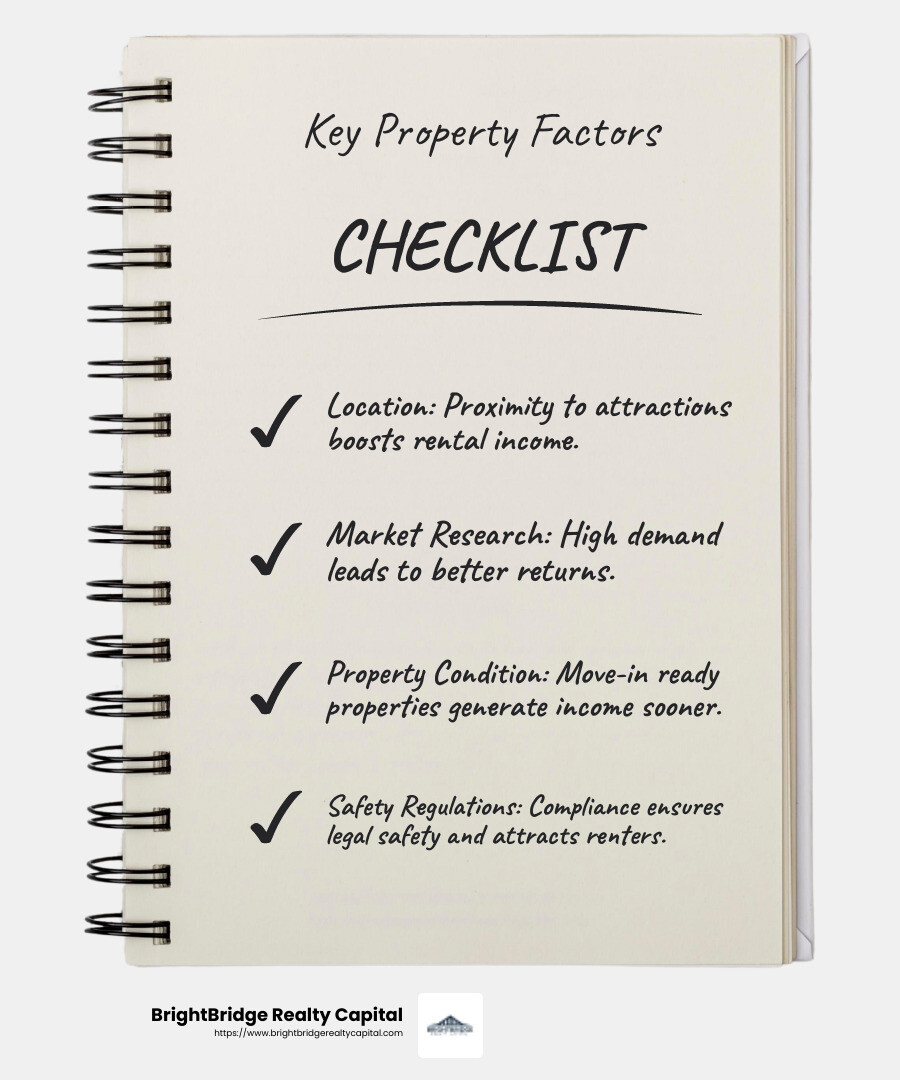The Ins and Outs of Holiday Rental Mortgages

Holiday rental mortgage is a key term for anyone looking to invest in the lucrative world of vacation properties. These specialized loans are designed to help you purchase homes that can be rented out to holidaymakers. This allows you to not only bask in the beauty of a vacation spot whenever you choose but also to earn an income during unused times.
- Purpose: Purchase properties for short-term rentals.
- Income: Generate income through holiday rentals.
- Investment: Potentially higher rates compared to buy-to-let mortgages.
With strategic financial planning, a holiday rental can be both a personal retreat and a valuable asset in diversifying your investment portfolio. However, navigating the financial and regulatory landscape requires keen preparation. By understanding the nuances of holiday rental mortgages, such as specific lending criteria and associated costs, investors can make informed decisions that maximize returns.

Common holiday rental mortgage vocab:
- financing a vacation rental home
- getting a loan for a vacation home
- conventional vacation rental financing
Understanding Holiday Rental Mortgages
Holiday rental mortgages are a unique type of financing designed for properties you intend to rent out to vacationers. These properties, known as holiday lets or vacation rentals, are rented on a short-term basis, typically to tourists looking for a temporary place to stay.
What Makes Holiday Rental Mortgages Different?
Purpose: Unlike traditional buy-to-let mortgages, which are meant for long-term rentals, holiday rental mortgages cater to short-term rentals. This means the property is available for guests for brief periods, often less than a week at a time.
Income Potential: Holiday rentals can generate higher income per night compared to long-term rentals. However, this income can be variable due to factors like seasonality and location demand.
Furnishing Needs: Properties under holiday rental mortgages must be fully furnished and equipped to a high standard. This is crucial because guests expect a home-like experience, complete with amenities.
Key Considerations
Occupancy Requirements: To qualify as a furnished holiday let for tax purposes, the property must be available for rent at least 210 days a year and let out for at least 105 days.
Interest Rates: These tend to be higher than standard mortgages due to the perceived risk of short-term rentals. Lenders view these properties as riskier because the income isn't guaranteed year-round.
Tax Advantages: One of the perks of holiday rentals is the ability to deduct mortgage interest from rental income. This can reduce taxable income, making it a more attractive option for some investors.

Why Choose a Holiday Rental Mortgage?
Investing in a holiday rental property can be rewarding if done right. The ability to use the property yourself while also earning income is a significant draw. Plus, with the right property, the rental income can cover mortgage payments and more.
However, understand the responsibilities and regulations involved. Compliance with safety standards and keeping up with market trends can make or break your investment.
For those ready to dive into vacation rentals, understanding the ins and outs of holiday rental mortgages is crucial. This knowledge can guide you in selecting the right property and financing options to suit your investment goals.
Key Differences Between Holiday Let and Buy-to-Let Mortgages
When it comes to property investment, understanding the differences between holiday let mortgages and buy-to-let mortgages is crucial. These differences can impact your investment strategy, potential income, and the type of property you might choose.
Intended Use
Buy-to-let mortgages are designed for properties that are rented out on a long-term basis. Tenants usually sign leases for six months or more, making it a stable investment option.
In contrast, holiday let mortgages are for properties intended for short-term stays. These properties cater to vacationers, with rental periods often lasting a week or less. This means the property must be available for rent for at least 210 days a year and actually rented out for at least 105 days to qualify for tax advantages.
Rental Income
The potential income from a holiday let can be higher per night compared to a buy-to-let. However, this income is often variable. Seasonal demand plays a big role, so while summer months might bring high occupancy and rates, off-peak times could lead to vacancies.
Buy-to-let properties usually generate a more predictable monthly income, as tenants pay rent consistently over longer periods.
Furnishing Requirements
Holiday lets must be fully furnished and equipped to a high standard. Guests expect amenities that make their stay comfortable, such as a fully stocked kitchen, quality linens, and entertainment options.
On the other hand, buy-to-let properties are often rented out unfurnished or semi-furnished. Tenants typically bring their own furniture, reducing the initial setup cost for the landlord.
Occupancy Requirements
Holiday let properties have specific occupancy requirements to maintain their status for tax purposes. They cannot be rented for more than 31 consecutive days to a single guest. This ensures the property remains available for short-term rentals throughout the year.
Buy-to-let properties are typically occupied by long-term tenants who use the property as their primary residence. This means less turnover and potentially fewer management headaches.
Mortgage Terms
Interest rates on holiday let mortgages can be higher than those on buy-to-let mortgages. The short-term rental market is seen as riskier by lenders due to its fluctuating income patterns. As a result, the terms of the mortgage may include higher interest rates and stricter qualifying criteria.
Buy-to-let mortgages often offer more favorable terms, reflecting the stability of long-term rental income. This can make them a more attractive option for conservative investors seeking steady returns.
Understanding these key differences can help you decide which type of mortgage and property investment aligns best with your financial goals. Whether you prefer the potentially higher, but less predictable, income of a holiday let or the stability of a buy-to-let, knowing these distinctions is crucial for successful property investment.
How to Qualify for a Holiday Rental Mortgage
Qualifying for a holiday rental mortgage involves meeting specific lending criteria. Lenders are cautious because these properties can have variable income streams. Here's what you need to know:
Lending Criteria
Lenders often have stricter criteria for holiday rental mortgages compared to traditional buy-to-let loans. They assess not only your financial situation but also the potential of the property to generate rental income.
- Property Location: The property's location is crucial. Areas with high tourist demand are more attractive to lenders.
- Rental Potential: Lenders will look at the projected rental income. This involves analyzing occupancy rates and seasonal demand.
Borrower Income
Your personal income plays a significant role in the approval process. Lenders want to ensure you can cover mortgage payments during off-peak seasons when rental income might be low.
- Minimum Income Requirements: Many lenders require a minimum income threshold. This varies but is often set to ensure financial stability.
- Income Proof: Be prepared to provide proof of income, such as tax returns or payslips. If you have other rental properties, this income can also be considered.
Deposit Requirements
Deposits for holiday rental mortgages are typically higher than those for standard residential mortgages.
- Deposit Size: Expect to provide a deposit of 25% to 30% of the property's value. In some cases, it can be as high as 40%.
- Equity Release: If you own another property, you might consider releasing equity to cover the deposit.
Insurance
Insurance is essential for protecting your investment. Lenders will often require specific types of insurance.
- Building Insurance: This is mandatory to cover the structure of the property.
- Public Liability Insurance: Important for holiday lets, this covers any claims made by guests for injuries or damages.
- Contents Insurance: Given that holiday rentals are fully furnished, contents insurance is crucial to protect your belongings.
By understanding these requirements and preparing accordingly, you can increase your chances of securing a holiday rental mortgage. Each lender may have slightly different criteria, so it's important to shop around and find the best fit for your circumstances.
Costs Associated with Holiday Rental Mortgages
When diving into holiday rental mortgages, understand the costs involved. These costs can vary significantly from traditional residential mortgages, so let's break them down.
Interest Rates
Interest rates for holiday rental mortgages are typically higher than those for standard residential loans. This is because lenders view holiday rentals as a higher risk due to fluctuating income streams.
- Typical Rates: Expect interest rates to range from around 3% to 6% or more, depending on your financial situation and the lender's criteria.
- Variable vs. Fixed: Some lenders offer both variable and fixed-rate options. Fixed rates provide stability, while variable rates might offer lower initial costs but can fluctuate.
Fees
Several fees come with securing a holiday rental mortgage. These are important to consider when calculating the total cost of your investment.
- Arrangement Fees: These are charged by the lender to set up your mortgage. They can range from a few hundred to several thousand dollars.
- Valuation Fees: Lenders require a property valuation to ensure it meets their criteria. This fee covers the cost of the valuation process.
- Legal Fees: You'll need a solicitor to handle the legal aspects of the mortgage. These fees can vary based on the complexity of the transaction.
- Survey Fees: A survey is often required to assess the property's condition. This fee ensures there are no significant issues with the property.
Loan Terms
The terms of a holiday rental mortgage can differ from those of a residential mortgage, so it's crucial to understand what you're agreeing to.
- Loan Duration: Loan terms can range from 5 to 30 years. Shorter terms often come with higher monthly payments but less interest over time.
- Repayment Options: Some lenders offer interest-only options, where you pay only the interest for a set period. This can be useful if you anticipate higher rental income in the future.
- Early Repayment Charges: Be aware of any penalties for paying off your mortgage early. These charges can be substantial and impact your decision to refinance or sell.
Understanding these costs will help you make an informed decision when choosing a holiday rental mortgage. It's always a good idea to consult with a financial advisor or mortgage broker to explore your options and find the best deal for your situation.
Tips for Choosing the Right Holiday Rental Property
When it comes to picking the perfect holiday rental property, there are several key factors to consider. Let's explore the most important ones.
Location
Location is everything in real estate, and holiday rentals are no exception.
- Proximity to Attractions: Choose a property close to popular tourist spots. This makes it more appealing to potential renters and can increase your rental income.
- Accessibility: Ensure the property is easy to get to. Good transport links and nearby amenities can make a big difference.
- Local Climate: Consider the weather patterns. Properties in regions with mild climates may attract renters year-round.
Market Research
Before making a purchase, thorough market research is essential.
- Rental Demand: Speak with local estate and lettings agents to understand the demand in the area. High demand can lead to higher occupancy rates and rental income.
- Competition: Analyze other holiday rentals in the area. What are their rates, and how often are they booked?
- Trends: Keep an eye on tourism trends. Areas that are gaining popularity may offer better long-term returns.
Property Condition
The condition of the property can significantly impact your investment.
- Move-In Ready vs. Fixer-Upper: A property that is ready to rent immediately can start generating income sooner. However, a fixer-upper might offer a lower purchase price but could require significant time and money to renovate.
- Maintenance Needs: Consider the ongoing maintenance the property will need. Properties with extensive landscaping or older systems may have higher upkeep costs.
Safety Regulations
Ensuring your property meets safety standards is not just a legal requirement but also crucial for attracting renters.
- Compliance: Check that the property complies with local safety regulations, including fire, gas, and electrical safety standards.
- Certificates: Make sure you have all necessary certificates to prove compliance. This can protect you from legal issues and reassure potential renters.
Choosing the right holiday rental property involves careful consideration of these factors. By focusing on location, conducting thorough market research, assessing property condition, and ensuring compliance with safety regulations, you can make a wise investment that pays off in the long run.

Now that you know how to select the right property, let's move on to some commonly asked questions about holiday rental mortgages.
Frequently Asked Questions about Holiday Rental Mortgages
What is the minimum deposit required?
When securing a holiday rental mortgage, you'll typically need a deposit of 25% to 30% of the property's value. This means if you're eyeing a property worth $200,000, you should be prepared to put down at least $50,000. The more you can afford to deposit, the better the mortgage terms you might receive.
How does rental income affect mortgage approval?
Rental income plays a crucial role in mortgage approval. Lenders often require that your projected rental income is 125% to 145% of your monthly mortgage payments. This ensures you can cover the mortgage even during off-peak seasons. For example, if your monthly mortgage payment is $1,000, your rental income should ideally be between $1,250 and $1,450.
What are the tax implications of owning a holiday rental?
Owning a holiday rental comes with various tax implications. You'll need to report rental income on your tax return, which could affect your income tax liability. However, you can deduct certain expenses, like mortgage interest and maintenance costs, from this income.
Capital gains tax is another consideration. When you sell your holiday rental, any profit you make is subject to capital gains tax. It's wise to consult with a tax professional to understand these implications fully and to ensure you take advantage of any available tax reliefs.
Armed with this knowledge about deposits, rental income, and tax implications, you're better prepared to steer holiday rental mortgages.
Conclusion
At BrightBridge Realty Capital, we understand that financing a holiday rental mortgage can be a complex journey. Our mission is to simplify this process with our custom financing solutions. Whether you're a seasoned investor or just starting out, we offer quick, flexible funding to help you secure your ideal vacation rental property.
One of our standout features is our ability to close deals rapidly—often within just one week. This speed is crucial in the competitive real estate market, where opportunities can vanish as quickly as they appear. By cutting out intermediaries, we streamline the process and offer competitive rates, ensuring you get the best deal possible.
Our nationwide reach means we can provide support and expertise no matter where your investment is located. From busy urban centers to serene coastal retreats, we're here to help you every step of the way.
If you're ready to explore your options and take the next step in your holiday rental investment, visit BrightBridge Realty Capital today. Let us help you turn your real estate dreams into reality with our expert guidance and fast, reliable financing solutions.


